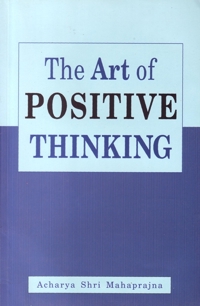It is fascinating to observe how Sri Yuvacharya Mahaprajna's[1] most thought-provoking and breathtakingly lucid books come into being. At the appointed hour, a lean tall man with a calm, smiling face enters the hall the shivrarthis are gathered to practise dhyana. After initiating them into the precise mode and conduct of the day's meditation, he takes up a pad and jots down a few points - an outline of the discourse he would deliver an hour later. All through his writing, he is aware of the passage of time, glancing at the clock every now and then and giving further instructions to the sadhaks. At the conclusion of the meditation session, he smiles at his audience and asks, "How did it go?"
There is a short intermission for tea or lemon water and the great man returns and begins his discourse, without once looking at the pad on which he had earlier jotted down certain points. He speaks for nearly an hour in fluent and chaste Hindi. At the end of the discourse he answers questions. He does so everyday for the duration of the shivir. At the conclusion of the shivir, a new book is born, for it is his daily discourses duly recorded which are later edited and printed.
Sri Yuvacharya ji is a living embodiment of the truth enunciated by Acharya Sri Tulsi in his address to the sadhaks at Chavadia village near Marwar (Rajasthan). Speaking to the shivrarthis on that occasion, Acharya Tulsi proclaimed, "We do not ask whether you are a Jain; we only ask whether you are a man." For true religion, the great teacher maintained, has nothing to do with sects. Religion, in the right sense of the word, means the art of living sanely, intelligently so as never to create any problems at all.
It is this religion, transcending all sectarian considerations, and spreading the message of universal joy, which is the subject of Yuvacharya's discourses. Yuvacharyaji constitutes in himself an institution for helping men achieve self-realization and for bringing about a new world based on love and understanding through individual transformation. He is an inexhaustible fountain of supernal wisdom, born of profound experience in spiritual meditation. It is one's great good fortune to hear him speak. The next best is to read him in the original. But the wisdom embodied in his speech is so deep that even at second hand, in a translation, it leaves its impact upon the mind.
It has, therefore, been a joyful privilege for me to translate into English some of Yuvacharyaji's immortal works. (The present volume is a free translation of Kaise Sochen?) For earnest seekers who are keen on developing an integrated personality, his discourses have value beyond words.
I take this occasion to reiterate my heartfelt gratitude to my friend Dr. Prem Nath Jain who first introduced me to.the great Jain saints of modern India. I am also most grateful to Jetha Bhaiji and Muni Shri Mahendra Kumar ji, whose loving guidance and active co-operation have helped me rid this translation of many inadequacies. The title in English 'The Art of Positive Thinking' and certain modifications in the text in keeping with the spirit of the original were adopted in consultation with them.
Grateful thanks are due to Jain Vishva Bharati, the sponsors of the present series of translations, who have provided me with all amenities for the prosecution of my work. Indeed, Jain Vishva Bharati has become for me cherished home in the evening of my life. What I have gained here - supreme ecstasy - I regard to be the summumbonum of life. It would be my constant endeavour, through my work, to repay in some measure, however inadequate, the immeasurable benefits I have derived from living in close proximity with the saints, sadhvis, samans and samanis. For me, in the words of a poet,
if there is a heaven on earth,
it is here, here, here!
Finally, all great work in the Terapanthic order gets done with the benediction of its eternally dynamic Preceptor, Acharya Sri Tulsi. Both my wife and I are fortunate to have in ample measure his love and blessings. No words can repay our debt to him.
R.K. Seth
Jain Vishva Bharati
Ladnun - 341 306.
 Acharya Mahaprajna
Acharya Mahaprajna

